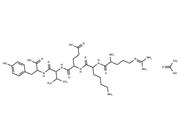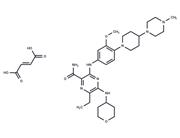| Name | Gilteritinib |
| Description | Gilteritinib (ASP2215) is a potent inhibitor of FMS-related tyrosine kinase 3 (FLT3) and AXL tyrosine kinase receptors (IC50 = 0.29 nM and <1 nM, respectively). In preclinical studies, gilteritinib demonstrated strong antileukemic and antitumor effects. Gilteritinib is currently in several Phase 3 clinical trials for acute myeloid leukemia. |
| Cell Research | Gilteritinib is dissolved in DMSO and stored, and then diluted with appropriate media before use.The effect of Gilteritinib on MV4-11 and MOLM-13 cells is assessed using the CellTiter-Glo Luminescent Cell Viability Assay. Subsequent studies are conducted to examine the effect of Gilteritinib and Quizartinib on Ba/F3 cells expressing either FLT3-ITD, FLT3-D835Y, FLT3-ITD-D835Y, FLT3-ITD-F691 L, or FLT3-ITD-F691I. MV4-11 and MOLM-13 cells are treated with DMSO or increasing concentrations of Gilteritinib (0.01, 0.1, 1, 10, and 100 nM) for 5 days, and cell viability is measured using CellTiter-Glo |
| Kinase Assay | The kinase inhibitory activity of Gilteritinib is tested against a panel of 78 tested kinases using ATP concentrations that are approximately equal to the Km value for each kinase in a TK-ELISA or off-chip mobility shift assay. Initially, two concentrations of Gilteritinib (1 nM and 5 nM) are tested to assess each compound's inhibitory effect on TK activity. Further studies are then conducted using a dose range of Gilteritinib to determine IC50 values for kinases in which activity is inhibited by >50% with 1 nM Gilteritinib as well as for c-KIT. TK-ELISA and MSA assays are used to conduct IC50 studies for FLT3, LTK, AXL, and c-KIT; the HTRF KinEASE-TK assay is performed to assess the IC50 value of echinoderm microtubule-associated protein-like 4-ALK (EML4-ALK) |
| Animal Research | MiceAntitumor activity is evaluated in nude mice transplanted with MV4-11 AML cells. The pharmacokinetics in xenografted mice is also investigated. MV4-11 xenografted-mice are treated with oral administration of Gilteritinib at 10 mg/kg for 4 days. Treatment of Gilteritinib for 28 days results in dose-dependent inhibition of MV4-11 tumor growth and induces complete tumor regression at more than 6 mg/kg |
| In vitro | Gilteritinib (ASP2215) has been tested against 78 tyrosine kinases, demonstrating strong inhibitory effects on FLT3, leukocyte tyrosine kinase (LTK), anaplastic lymphoma kinase (ALK), and AXL kinases, reducing their activity by over 50% at a concentration of 1 nM. Particularly, Gilteritinib exhibits an IC50 of 0.29 nM for FLT3, making it approximately 800 times more effective against FLT3 than against c-KIT, for which the IC50 is 230 nM. Furthermore, it significantly inhibits eight out of the tested kinases at concentrations up to 5 nM, including TRKA, ROS, RET, and MER, in addition to those previously mentioned. In cell-based assays, Gilteritinib effectively suppresses the growth of MV4-11 and MOLM-13 cells, which naturally express FLT3-ITD mutations, with mean IC50 values of 0.92 nM and 2.9 nM, respectively, upon 5-day treatment. This antiproliferative effect correlates with the reduction of FLT3 phosphorylation and the downstream inhibition of ERK, STAT5, and AKT phosphorylation. A study exploring its impact on AXL inhibition in MV4-11 cells that express exogenous AXL revealed dose-dependent decreases in phosphorylated AXL levels following 4 hours of treatment, highlighting Gilteritinib's potent inhibitory action on both FLT3 and AXL signaling pathways. |
| In vivo | In MV4-11 xenografted mice, administration of Gilteritinib (ASP2215) orally at 10 mg/kg for four days markedly elevates its tumor concentration, achieving levels over 20-fold higher than in plasma. A 28-day course of Gilteritinib treatment demonstrates dose-dependent suppression of MV4-11 tumor growth, with complete regression observed at dosages exceeding 6 mg/kg. Additionally, Gilteritinib significantly reduces tumor presence in the bone marrow and extends the survival of mice that have undergone intravenous transplant with MV4-11 cells. |
| Storage | Powder: -20°C for 3 years | In solvent: -80°C for 1 year | Shipping with blue ice/Shipping at ambient temperature. |
| Solubility Information | DMSO : 1 mg/mL (1.81 mM), Sonication is recommended.
Ethanol : 4 mg/mL (7.24 mM), Sonication is recommended.
H2O : Insoluble
10% DMSO+90% Saline : 0.2 mg/mL (0.36 mM), Solution.
|
| Keywords | Tyro3 | TAMReceptor | TAM Receptor | Mer | Inhibitor | inhibit | Gilteritinib | Fms like tyrosine kinase 3 | FLT3 | Cluster of differentiation antigen 135 | c-KIT | cKit | CD135 | AXL | Axl | ASP-2215 | ASP 2215 |
| Inhibitors Related | Bemcentinib | Regorafenib monohydrate | Sunitinib | Nintedanib | Imatinib Mesylate | Sorafenib | Dasatinib | Regorafenib | Lenvatinib mesylate | Lenvatinib | Pazopanib | Axitinib |

 United States
United States






